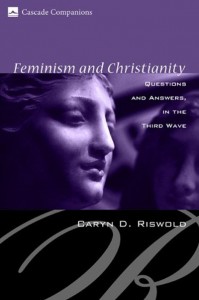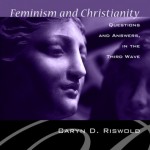 Though I wrote the book about eight years ago, I find myself still and once again answering basic questions that Christians have about feminism, and that feminists have about Christianity.
Though I wrote the book about eight years ago, I find myself still and once again answering basic questions that Christians have about feminism, and that feminists have about Christianity.
This time, it is in preparation for an interview with another website. I’ll share more from that piece once it is published, but thought I’d go ahead and share here the basic questions and summary answers that shaped my third book, Feminism and Christianity: Questions and Answers in the Third Wave, published in 2009, and eventually led to this blog. I’m happy to be able to draw on and share this work anew, as I have through excerpts published in the widely used introductory women’s studies textbook published by McGraw Hill, Women’s Voices, Feminist Visions, edited by Susan Shaw and Janet Lee.
(The following is adapted from pages 119-122 of Feminism and Christianity.)
- Why should feminists care about Christianity?
Feminism should reform Christianity to establish and maintain women’s equal humanity while confronting patriarchy – a status-quo ideology that maintains male power over women.
- Why should Christians care about feminism?
Christians should care about feminism because it brings the religion back to the root ideals of egalitarian human life glimpsed in its early years, and because feminism has contributed to revitalizing the religion by advocating the leadership and scholarly contributions of women.
- How has Christianity been a problem for women?
Christianity is guilty of misunderstanding women, holding them back, and legitimating their abuse, so feminists must subject it to scrutiny and hold it accountable for failure or for renewal.
- Why don’t feminists accept that the Bible teaches that men and women have different roles in creation, and that wives should submit to their husbands?
Feminists and Christians learn through closer historical, theological, and sociological examination that biblical texts and religious teachings against the full equality of men and women are limited by their contexts in their ability to communicate truth.
- Has Christianity been oppressive only on the basis of gender?
The shameful Christian legacy of violence against and exploitation of other religious people and the earth is being overcome by faithful activism in which feminists can and should participate.
- Isn’t feminism just a lot of whining, privileged, white women?
Feminism in the third wave is a global justice movement acting on behalf of women’s full equality at the intersection of race, class, gender, and other aspects of identity – making it even more relevant for a global Christianity in the twenty-first century.
- How has Christianity affected women’s lives in a positive way?
Christianity has been good for women because of its theological vision of equality under a compassionate God and because of its historical and present practice of radical community organizing and transformation led by women.
- Do feminists just want to turn patriarchy into a matriarchy?
Feminism’s focus on women names the problem of sexism and the reality of inequality in society and the church, challenging a system that values and grants power to some people over others on the basis of unearned privileges.
- How are feminists changing the fact that Christianity has been anti-feminist, if not anti-woman?
Feminists are changing the fact that Christianity has been anti-feminist and anti-woman through activism, scholarly engagement, and faithful participation that have resulted in denominations and biblical shifts toward inclusion.
A person can be both Christian and feminist because the two identities share core commitments to human dignity and equality, justice among people, and sustainable relations with the earth.
- If Jesus was a feminist, and Paul was a misogynist, what’s the real Christianity?
While it is anachronistic to claim that Jesus was a feminist, and too limiting to name Paul a misogynist, deeper knowledge about each of the historical figures is simply part of the larger story of the real Christianity.
- Are all feminists really lesbians? Doesn’t feminism at least promote the sin of homosexuality?
Debunking assumptions about feminism as well as Christianity when it comes to homosexuality leads to a realistic challenge to the religious tradition that some denominations are meeting and others are battling.
- How do different Christian sects or denominations deal with women?
Different Christian denominations deal with women in a variety of ways from complete exclusion to complete inclusion in leadership roles; a corresponding diversity of ideas about women’s equality and humanity reveals that despite a bento toward justice in Christianity, the religion continues to have loud and powerful leaders insistent on preserving patriarchal power.
- Does feminism include goddess worship? If so, isn’t it anti-Christian?
Feminism challenges Christianity to understand its history of suppressing concepts of a female deity as well as to open itself up to a rich storehouse of images and names for God that more fully represents human experience.
- Is Christianity better or worse for women than other religions?
Christianity is incredibly similar to other religions when it comes to women: A wide range of views and ways of treating women have always been connected to an intricate set of historical and political factors that can completely affirm as well as completely subordinate and mistreat women.
- Why do women think they can be pastors?
Women think they can be pastors on the basis of their own internal sense of being called by the Spirit of God along with a faithful interpretation of biblical texts that has reformed the Christian tradition in the direction of inclusion.
For more detailed discussion of any one or more of these, along with introductory discussions and definitions of both feminism and Christianity, you can get Feminism and Christianity: Questions and Answers in the Third Wave via your local independent bookstore or online.
Images mine.

















